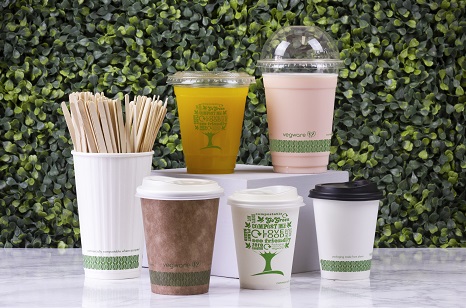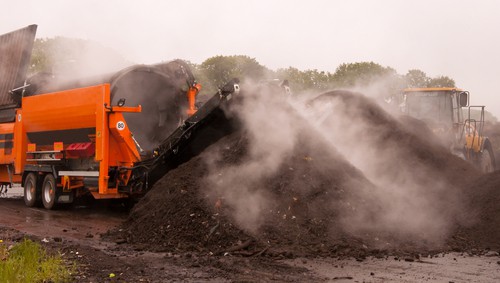Garden waste composting facilities across the UK have been permitted to process certified compostable packaging materials, including cups and lids.
They qualify if milk or cream fit for human consumption is the only animal by-product present, and the packaging holds a valid compostability certificate from an independent certification body.

Compostable food packaging manufacturer, Vegware, hailed the move as a “game changer” for compostables
The news has been announced by the REA’s Organics Recycling Group, following talks with the Animal and Plant Health Agency (APHA), Environment Agency and Scottish Environment Protection Agency. It was facilitated by Edinburgh-based Vegware, which specialises in plant-based compostable foodservice packaging.
Commercial
According to Charlie Trousdell, chair of the Organics Recycling Group, the initiative is aimed at the commercial sector where a company sells certified compostable packaging to a restaurant, café or similar.
Examples of facility types that can compost the certifiable compostable material types using a suitable environmental authorisation include open-air turned windrow and outdoor static aerated pile systems.
According to Vegware, the move “dramatically increases” the number of facilities allowed to process compostable drinks containers. And, it adds to the 53 in-vessel composting (IVC) facilities licensed to process food waste, Vegware reports.
“Fundamentally this is a good step on the way to getting plastics out of the organic waste stream but requires effort by all parties to get it working properly.”
Charlie Trousdell
Organics Recycling Group
In the wake of the announcement, Mr Trousdell emphasised the need for a “joined up” approach between the seller of the packaging, businesses using the packaging, collection companies and the composter.
He said this will give the composter “confidence that the café only places the finished coffee/drinks cups (and other approved waste) in the compostable bag.
“The compostable bag should be easily identified to the user so in the event of any issues it can be traced back to that company.”
According to Mr Trousdell, there are a number of ways these materials can be added to existing collection rounds “to provide a cost and environmentally efficient system”.
“Fundamentally this is a good step on the way to getting plastics out of the organic waste stream but requires effort by all parties to get it working properly. No composter wants plastic in the waste stream so anything to minimise this is to be welcomed,” he said.
Trial
Welcoming the news, Jeremy Jacobs, technical director at the Renewable Energy Association, said: “Every year 300 million tonnes of new plastic are produced, so ensuring as much as possible is recycled and reused is an urgent and critical issue if we want to tackle plastic pollution in our soils, rivers and seas.

The news means that some compostable packaging can be treated at garden waste composting facilities, such as those that use open air windrows
“Any composter considering composting these types of material for the first time in their facility should run a trial with the waste supplier and evaluate it before deciding whether to enter into a contract with them.”
Material
Following the discussions, compostable material types allowed to be composted in a facility that does not have APHA approval under animal by-products regulations are:
- hot and cold drinks cups*,
- lids for hot and cold drinks cups*,
- drinks cup clutches / holders / sleeves*,
- drinks stirrers that consist of only untreated wood without any additives,
- drinks stirrers made of other compostable materials and/or include an additive*,
- straws*,
- coffee pods / capsules*,
- used coffee grounds,
- used loose leaf tea, and
- used tea in tea bags*,
*The compostable packaging and non-packaging items marked above with an asterisk must have a valid certificate of compliance with at least one of the following standards: EN 13432, EN 14995 or ASTM D6400. The certificate must have been issued by an independent certification body.
The post Compostable cups get green light for composting sites appeared first on letsrecycle.com.
Source: letsrecycle.com Plastic



